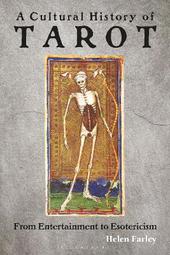
|
A Cultural History of Tarot: From Entertainment to Esotericism
Paperback / softback
Main Details
| Title |
A Cultural History of Tarot: From Entertainment to Esotericism
|
| Authors and Contributors |
By (author) Helen Farley
|
| Physical Properties |
| Format:Paperback / softback | | Pages:288 | | Dimensions(mm): Height 234,Width 156 |
|
| Category/Genre | Alternative belief systems |
|---|
| ISBN/Barcode |
9781788314916
|
| Classifications | Dewey:133.32424 |
|---|
| Audience | |
|---|
| Illustrations |
28 integrated bw, 11 tables
|
|
Publishing Details |
| Publisher |
Bloomsbury Publishing PLC
|
| Imprint |
I.B. Tauris
|
| Publication Date |
22 August 2019 |
| Publication Country |
United Kingdom
|
Description
The enigmatic and richly illustrative tarot deck reveals a host of strange and iconic mages, such as The Tower, The Wheel of Fortune, The Hanged Man and The Fool: over which loom the terrifying figures of Death and The Devil. The 21 numbered playing cards of tarot have always exerted strong fascination, way beyond their original purpose, and the multiple resonances of the deck are ubiquitous. From T S Eliot and his 'wicked pack of cards' in "The Waste Land" to the psychic divination of Solitaire in Ian Fleming's "Live and Let Die"; and from the satanic novels of Dennis Wheatley to the deck's adoption by New Age practitioners, the cards have in modern times become inseparably connected to the occult. They are now viewed as arguably the foremost medium of prophesying and foretelling. Yet, as the author shows, originally the tarot were used as recreational playing cards by the Italian nobility in the Renaissance. It was only much later, in the 18th and 19th centuries, that the deck became associated with esotericism before evolving finally into a diagnostic tool for mind, body and spirit. This is the first book to explore the remarkably varied ways in which tarot has influenced culture. Tracing the changing patterns of the deck's use, from game to mysterious oracular device, Helen Farley examines tarot's emergence in 15th century Milan and discusses its later associations with astrology, kabbalah and the Age of Aquarius.
Author Biography
Helen Farley is Lecturer in Studies in Religion and Esotericism at the University of Queensland. She is editor of the international journal Kthonios: A Journal for the Study of Religion and has written widely on a variety of topics and subjects, including ritual, divination, esotericism and magic.
Reviews`Deeply researched and elegantly written, Farley's is by far the most important contemporary contribution to the academic study of the Tarot. No serious work in the history of Western Esotericism will be able to ignore the author's ground-breaking study. Engrossing and fascinating' - Philip C Almond, Emeritus Professor of Studies in Religion, University of Queensland, 'Helen Farley takes the reader deep into the diverse worlds of late Renaissance Italy, Enlightenment France, Victorian England and New Age America - and a host of other milieux - in her impressive study of tarot symbolism. She offers a comprehensive yet detailed study of the changing imagery in the cards as they emerged from their evolving historical contexts. Rarely does a book offer such a wealth of information over such a broad span of time in a way that does justice to its subject: but Farley accomplishes her task with thoroughness and diligence. A Cultural History of Tarot makes a welcome and valuable contribution to the body of recent scholarship on the history of esotericism. More than that, it provides a roadmap to show how scholars of art and culture can engage meaningfully with the fascinating esoteric strands of Europe's past.' - Christina Oakley Harrington, Proprietor, Treadwell's Bookshop, London
|